Download A4 | US Letter PDF 597Kb
About : Social Tapestries was a programme of projects run by Proboscis between 2004 to 2008, and followed on from the Urban Tapestries project. This eBook provides an overview of our aims and objectives as well as some of the key projects which we undertook, including Snout, Robotic Feral Public Authoring, Conversations and Connections, Everyday Archaeology and Experiencing Democracy.
This publication coincides with the Digital Cities: London's Future exhibition at the Building Centre in London (21 Nov 2008-17 Jan 2009).
Published November 2008
Giles Lane is an artist, researcher and teacher. He founded and is co-director of Proboscis, a non-profit creative studio based in London where, since 1994, he has led projects such as Urban Tapestries; Snout; Mapping Perception; Experiencing Democracy; Everyday Archaeology; and Private Reveries, Public Spaces. Giles is a Visiting Tutor on the MA Design Critical Practice at Goldsmiths College (University of London) and is a Research Associate of the Media and Communications Department at London School of Economics. Giles was elected a Fellow of the Royal Society of Arts in 2008 for his contribution to community development through creative practice.

Download the Activity and Evaluation Report (PDF 3.7Mb) on our week long workshop with Year 4 at the Jenny Hammond Primary School in July 2007.
The project documentation for Snout is now complete and available to view online or download. It covers the project's goals, research and technical aspects as well as an overview of concepts and trends in 'participatory sensing'. Detailed descriptions of the hardware and software solutions developed and used in the project as well the design and making of the costumes are provided. Accompanying the documentation report is a zipped archive of the Snout Sensing Platform Source Code.
PDF
HTML version
Snout Source Code
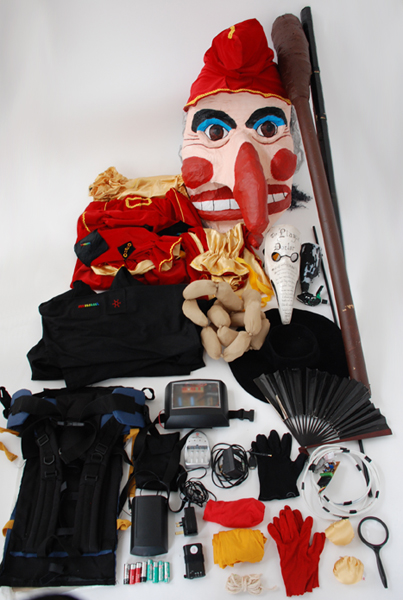
PDFs of the five maps of the Atlas of Enquiry are now available to download.
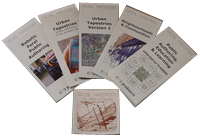
– Public Authoring, Education & Learning
– Neighbourhoods & Communities
– Urban Tapestries public authoring in the wireless city
– Urban Tapestries version 2
– Robotic Feral Public Authoring
Printed versions are still available to buy from the Proboscis Store
In April Karen Martin participated in the Shared Encounters workshop at CHI07. Karen and I submitted a paper for the workshop, called Making Glue.
our daily life is characterised by encounters, some are fleeting and ephemeral and others are more enduring and grounded exchanges. We will investigate the potential for technologies to enable shared interactions that can re-inhabit the place-based social networks of the city.
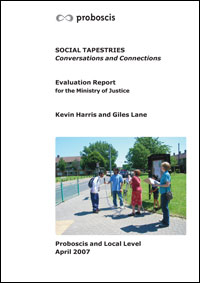
A report (by Kevin Harris and Giles Lane) on the Conversations and Connections project in the Havelock Estate in Southall, is now available to download. It explores the challenges we encountered and the solutions we developed in researching what public authoring could offer for community cohesion and democratic engagement in a low income social housing scheme with serious problems of institutional neglect and low opportunity. In evaluating the project's impact and achievements it offers some key lessons and policy messages for trying to stimulate participation and engagement through technological innovation. The project was funded by an Innovation Grant from the Electoral Policy Division of the Ministry of Justice (formerly the Department for Constitutional Affairs).
A bound version is available to buy from the Proboscis Store for £5.00 plus postage and packing.
Mediamatic Hybrid World Lab
Mediamatic, Amsterdam May 7th to 9th
Giles will be giving a series of talks about Proboscis' work and coaching participants in the workshops.
TakeAway Festival
Dana Centre, Science Museum London May 10th 6pm
Giles will be giving a presentation on our concept of scavenging for public authoring at the DIY media festival.
Futuresonic Social Technologies Summit
Contact Theatre, Manchester May 11th 10am-6pm
Giles will be giving a keynote on 'Collaboration as Ethos' in the Collaborating Across Boundaries session, chaired by Anne Galloway.
New Media Scotland Poker Club
Beehive Inn, 18-20 Grassmarket, Edinburgh May 22nd 6pm
Future City with Giles Lane in conversation with Constance Fleuriot
The Creativity Conversation
Institute of Creative Technology, De Montfort University, Leicester June 11-12
Giles will discuss Proboscis' work and ethos within the context of collaborative and transdisciplinary practices.
Our contribution to Enter_Unknown Territories created around 40 StoryCubes (pictures below and on our Flickr site), a DIFFUSION eBook of Guardian blogger Sean Dodson's posts (A4 or US Letter version) on the conference blog and a special DIFFUSION eNotebook (A4 or US Letter version) for delegates to reflect on the networks, conversations and collaborations revealed during the conference.
Proboscis Public Authoring Zone @ Enter photoset
Proboscis will be running a Public Authoring Zone at Enter_Unknown Territories next week in Cambridge (April 26th & 27th).
Interwoven into the conference proceedings, Proboscis will create a meta-narrative of the debates and dialogues by inviting conference delegates to create DIFFUSION eBooks (using the prototype DIFFUSION eBook Generator) as well as an evolving 'landscape' of the conference themes, using Proboscis' StoryCubes format.
Images from today's event will be posted in the next few days, meanwhile the 'scavenged' web interface is now public at:
http://snoutlondon.ning.com
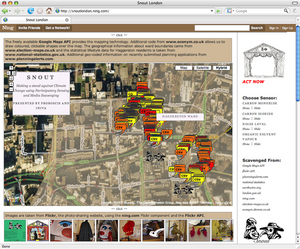
The site shows the sensors readings collected during the performance today together with a variety of other public data and services designed to make connections and give context to pollution in our environments. The site has been developed by Karen Martin and is built using ning.com – a free online service providing templates for building social networking sites with little or no programming ability. Woven into the ning site are mapping technologies from Google, photofeeds from Flickr, RSS feeds, ward level statistics (Census 2001) from National Statistics and links to other services such as writetothem.com, upmystreet conversations and local organic food delivery.
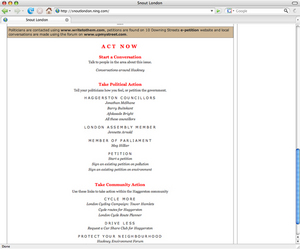
Update Kevin Harris of Local Level has blogged his impressions of the performance and forum, speculating on the role of this kind of public intervention in defusing community tension.
Chris Hand has also blogged the event and posted his photos on Flickr.
Andrew Curry has also blogged the event on his site looking at futures and emerging trends.
Snout aims to create conversations about the health of our local communities and environments through physical interventions in public space, and by the collection, collation and aggregation of data – environmental, statistical, social & cultural – about the places we inhabit. By exploring the human and natural ecologies of the world around us we become aware of our own impact on our environment. Picturing what we know, and discussing it with others offers an opportunity to change what we do, why we do it and what kind of future we wish to grow into.
Snout uses the theme of carnival and two specific characters, Mr Punch and the Plague Doctor, to suggest fun and engaging ways to collect data about the environment (through sensors in the costumes) and to start conversations with friends, neighbours and other people around us as part of popular events and festivals.
The Snout costumes are instrumented with four sensors (Carbon Dioxide, Carbon Monoxide, Benzene & Noise) and LED displays. Snout proposes ‘participatory sensing’ as a lively addition to the popular artform of carnival costume design, engaging the community in an investigation of its own environment, something usually done by local authorities and state agencies.
Scavenging – a recipe for public authoring
To enable online conversations as a pivot for wider community engagement, Proboscis is developing a scavenged web interface using free mapping and sharing technologies. Through this kind of guerilla public authoring communities can gather and visualise local environmental evidence, which can then become the basis for participating in or initiating local action. Snout is a model for social and cultural action that could be adopted by schools, carnival clubs or other community groups.
__________________________________________________
Venue: Cargo, 83 Rivington St, Kingsland Viaduct, London, EC2A 3AY
The performance will start at Cargo and the route will include Hoxton
Square and Hoxton Market
Dates/Times: Tuesday 10 April, Performance 10am, Conference 1.30-5pm.
Tube: Old St, Liverpool St
Admission: Free, but booking is essential (via inIVA)
Access: Limited, please call in advance for details
Information: +44 (0)20 7729 9616, www.iniva.org, institute@iniva.org
Supported by Arts Council England & Esmée Fairbairn
__________________________________________________
We recently spent several weeks in Australia participating in dLux Media Arts' Coding Cultures project. They have just published the Coding Cultures Handbook (edited by Francesca da Rimini) which is available as a PDF to download for free from dLux.
The Coding Cultures handbook features six invited writers and groups from Australia, Belgium, Brazil, England, Italy and Hong Kong who share their experiences of building imaginative digital tools, social networks, open labs and internet-based knowledge platforms for communication and creativity.Andrew Lowenthal (Aus) introduces an exciting free video sharing website, EngageMedia, built as an alternative to increasingly regulated commercial platforms. Furtherfield.org (UK) develop flexible and fun software tools to “Do It With Others”, participatory media tools for realtime image jams and performances over the internet. Leandro Fossá (Brazil) shares his enthusiasm for the groundbreaking “Pontos de Cultura”, or Digital Hotspots, 100s of free community-based multimedia centres to enable all Brazilians to access their rights to “digital citizenship”.
Complementing these commissioned texts are be contributions from the Coding Cultures Symposium speakers including internationally renowned artists Giles Lane and Alice Angus from Proboscis (UK) and Mervin Jarman and Camille Turner from the Container Project (Jamaica/Canada).
Dom & Mike at Lost & Found have just published their second issue – VOID – and written a small piece about Proboscis, Urban Tapestries and Social Tapestries.
You can download a PDF of the magazine here: www.wearelostandfound.eu/issue2.pdf or look for their extremely collectable hard copies (price £1) in all good bookshops!
StoryCubes Design Masterclass
Interaction Design Lab, University of Dundee/Duncan of Jordantone School of Art, Dundee Wednesday 7th February 2007
Giles Lane will run a workshop using StoryCubes as a design tool with students from the schools of computing and design studying in the Interactive Media Design programme. Giles will also be giving a presentation on Proboscis' work to students in the MSc Electronic Imaging programme on Thursday 8th.
Uncharted Territories: The Brave New World of Mapping
British Library, Wednesday 14th February 2007, 6-9pm
Proboscis will present our work on Social Tapestries and Urban Tapestries alongside Jen Southern & Jen Hamilton's Running Stitch.
Interpreting Space Lecture
CARTE , University of Westminster, Thursday 15th February 2007, 10am
Giles Lane will give a presentation on Urban Tapestries and Social Tapestries to students on the Visual Culture MA.
Coding Cultures Concept Labs & Symposium
Campbelltown Arts Centre/DLux, Campbelltown, Australia, March 5th-9th 2007
Proboscis will be mentoring (with Container) individuals or small groups of artists, filmmakers, musicians and creatives with an interest in community and network practices. We will also be presenting our work at the one day symposium on March 9th.
Artist's Talk by Alice Angus
Australian Centre for Photography, Sydney, Australia, Wednesday 14th March, 6.30pm
Alice Angus will give a presentation on Proboscis' recent projects and our work with DLux on Coding Cultures for ACP's public programme.
Creative Technology Lecture
Design Critical Practice, Goldsmiths College, University of London, March 20th 2007
Giles Lane will give a talk about our work in relation to tehnology, culture and society for the Masters programme in Design Critical Practice.
We've just returned from a week spent with Andrew Hunter – director of Render at the University of Waterloo, in Ontario, Canada. Andrew invited us to explore and devise a collaborative commissioned project with Render for 2007/08 inspired by our work on Social Tapestries. The other purpose of the visit was to participate in Render's Winter Lecture Series and to give a series of talks to students in the Fine Art, Curatorial Studies and Architecture programmes.
During the week our discussions evolved from creating a single piece of work into establishing a more fluid and long term partnership with Render to share ideas, practices and co-develop outcomes that bring our interests in space, place and context together. We aim to begin the first phase of the project in the Autumn with a collaboration between Proboscis, Render and students in the School of Architecture at the University.
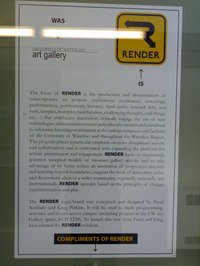
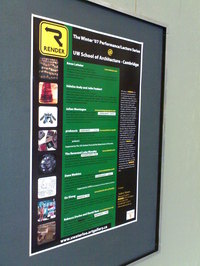

Proboscis now has sets of StoryCubes available to buy from the Proboscis Store. The StoryPacks contain StoryCubes in our new format (heavy card, pre-cut and scored for easy assembly) with sheets of blank stickers for writing, drawing and printing on. StoryPacks come in sets of 8, 27, 64 and 125 StoryCubes – we also have a Classroom StoryPack containing 40 StoryCubes designed for education use.

View images of StoryCubes posted on Flickr
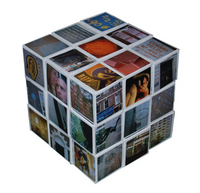
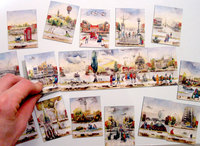
18 magnets, from a set of paintings by artist Alice Angus, to arrange in any order and create an endless journey of continuous, shifting panoramas.
download brochure
The Endless Landscape was a popular 18th and 19th century storytelling game. The paintings in this landscape, based on London, are from a larger series created for Social Tapestries. The magnets can be arranged in billions of combinations (around 6,402,373,705,728,000) to form a continuous landscape for creating stories.
Part fact and part fiction, the Endless Landscape plays with geography and history. It is littered with improbable landscapes,ghostly evocations and historical anomalies. Phantoms of a WW2 Barrage Balloon, the Montgolfiers’ 1783 hot air balloon, the 1903 Spencer Airship No2 and Amy Johnson’s de Havilland DH60 Gipsy Moth in which she flew to Australia in 1930, share the sky with Concorde and geese flying south.
Each magnet set costs UKP 9.95 plus post and packing (total £11.00 in the UK, £12.00 in Europe & £12.50 for World Airmail). You can buy them direct via credit card/Paypal from the Proboscis Store or by sending a cheque or postal order in UK pounds payable to Proboscis.
http://proboscis.org.uk/endlesslandscapes/
Update: The Landscape has been featured in various blogs: Londonist (a great blog exploring the many dimensions of London); Drawn (an illustrators' site); Stylefeeder; Neatorama
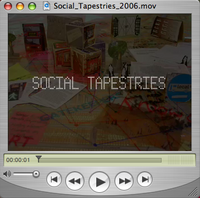
We've recently made a 4 minute film about Social Tapestries for Ofcom's Public Service Publisher Consultation, which is now available on our website. It gives a brief overview of our concept of public authoring, the Urban Tapestries software platform and some of our key community projects.
We contributed a case study on the Ordnance Survey (in relation to the questions of intellectual property and the public domain) to the IPPR's Public Innovation: intellectual property in a digital age which was published on Monday.
In addition to the case study (pp 55-57) is a section in the conclusions (p 85):
Opening up public sector information would present dramatic opportunities for entrepreneurship in the UK, without unduly benefiting overseas competitors. We support a recommendation related to us by Giles Lane from creative studio Proboscis that the functions of OS be split into two different components: one part being responsible for maintaining the National Geographic Database (NGD) and providing access to it on a ‘cost of reproduction’ basis to all who wish to use it, and another part that continues the OS’s legacy of innovation and product development, but that derives no commercial or competitive advantage from controlling the NGD.
The full proposal is below:
Accessing Public Geodata
Giles Lane, May 2006
Despite the Ordnance Survey's (OS) successes in widening provision for small groups such as academics and schoolchildren, the OS has not been able to create mechanisms that widen access to its core geodata for other non- governmental public uses. With its strong focus on cost recovery and development of new revenue models this does seem to be a conflict of interest. The Office of Public Sector Information (OPSI) is reported to agree that there is 'substance to to complaints from commercial mapping firms that OS has been "obstructive and slow" in licensing its data.' (The Guardian, 23/3/06). Whilst the OS disputes the findings of the OPSI, it also disputes the conclusion of Comptroller and Auditor General, National Audit Office regarding how it values the National Geographic Database (NGD) which it 'owns':
"In my opinion: in view of the effect of the decision not to capitalise the data held in Ordnance Survey's geospatial databases as a tangible fixed asset in accordance with Financial Reporting Standard 15, the financial statements do not give a true and fair view of the state of affairs of Ordnance Survey at 31 March 2005 or of its surplus, total recognised gains and losses and cash flows for the year then ended"
(source: OS Annual Report 2004-05, 13 June 2005)
This is not the first time the Auditor General has qualified the OS's accounts, in fact he has done so every year since it acquired Trading Fund status. The issue of valuing the NGD as an asset is complicated and open to different interpretations as to whether the OS's or the Auditor General's opinions offer the best value for taxpayers. However, it does highlight an increasing sense of frustration where a government department operates as an effective self-regulating monopoly controlling access to a public asset funded for over two hundred years by the taxpayer.
A Modest Proposal
One potential solution for the licensing impasse would be to separate the functions of the OS into two different components: one part being responsible for maintaining the National Geographic Database and providing access to it on a 'cost of reproduction' basis to all who wish to use it, and another part which continues the OS's legacy of innovation and product development but which derives no commercial or competitive advantage from controlling the NGD.
A possible model for this kind of separation of inheritance and service provision is the recent regulation of BT which separated the core national telephone network (which BT inherited on privatisation and has maintained and upgraded constantly since) from its own retail and business services provision. This separation was enforced to create a more fair and level playing field in the local loop unbundling of telecom services (through the new entity, Openreach) which had failed to gain momentum whilst BT retained control of the network and the exchanges and was competing with other companies wishing to install their own equipment and offer competitive services.
If the National Geographic Database were be accessible to anyone – including the OS itself – at no more than the cost of reproduction of the data, then the monopoly which the OS has inherited as a trading fund would be dissolved and new entrants would be just as able to deliver innovative new uses of GIS as the OS and other incumbents are today.
Eight new DIFFUSION eBooks have been published by Proboscis in our Species of Spaces and Liquid Geography series. The eBooks are, as ever, free to download from the website, print out and assemble. Readers are welcomed to share or re-distribute the eBooks with friends, colleagues or family either electronically (via the PDFs), by photocopy or as assembled books.
Species of Spaces
Heath Bunting – Single Step Guide to Success: Day Planning
Anne Galloway – Spaces and Places of Convergence
Lisa LeFeuvre – Urban Time Travel: Odd Lots and Floating Islands
Liquid Geography
Loren Chasse – Paths for a Listener
Jim Harold – Caesura: Cyprus • Kibris • Kypros
David Key – No Words
John Schofield – Constructing Place: When artists and archaeologists meet
Kathryn Yusoff – Landscape: Return • Dispersal • Circulation
A revised edition of the Urban Tapestries report (containing all three original reports from June 2005) is now available to download here (PDF 2Mb). The new edition of the report combines an overview of the project aims, practices, outcomes and policy proposals, a chronological account of its progress and an analysis of the feedback from participants in the bodystorming experiences and trials.
A bound version is available to buy from the Proboscis Store for £5.00 plus postage and packing.
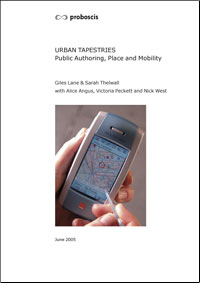
Over the past 15 months Proboscis has been collaborating on a Social Tapestries project with the members and ex-members of St Marks Housing Co-op. The co-op is a small group of people brought together by a common need to rent affordable housing. St Marks is a co-operative – all the members work together to locate 'shortlife' (i.e. not permanent) housing in London from Housing Associations. St Marks represents a community of need rather than a geographic community – the impermanence and transience of this kind of housing means that there is both a frequent turnover of housing and of members (as some leave for permanent or other housing).
Proboscis has been collaborating with members and ex-members to re-capture the history of the co-op over the past twenty six years of its existence, creating both a visual timeline and a 'scavenged' Social Tapestry public authoring system for the co-op to continue this process in the future. Public Authoring has been explored as a critical technique for the community to preserve and continue to build on its previous successes and experience.
Download the Report as a PDF (4.2Mb)
A bound version is available to buy from the Proboscis Store for £5.00 plus postage and packing.
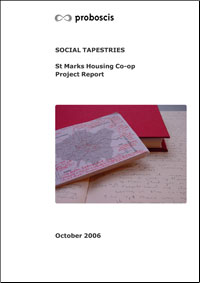
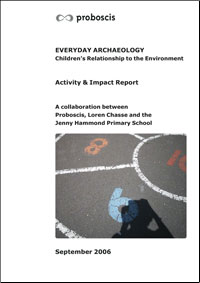
We've just published the Activity and Impact Report on our week long workshop with Year 4 at the Jenny Hammond Primary School back in July. Over the next school year we will be working with staff at the school to embed some of our tools and techniques into their everyday teaching and learning methods. We'll post more details here in the coming months.
A bound version is available to buy from the Proboscis Store for £5.00 plus postage and packing.
Update: The project is also featured as a case study on the London Schools Arts Service website.
We will be presenting the public authoring Feral Robots as part of Off The Map for Futuresonic this coming Friday, at the Museum of Science and Technology.
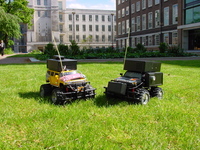
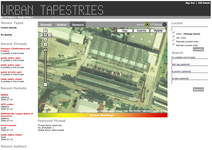
Our presentation is scheduled for 3pm where we'll be projecting sensor readings taken around the museum on Friday morning in the Urban Tapestries sensor map interface, and adding in local contextual knowledge to map against the sensors.
We'll be bringing up copies of the Atlas of Enquiry (price £5) with us – 5 maps covering the terrain of our projects in public authoring over the past four years. Come and find us if you would like to buy a copy at the event.
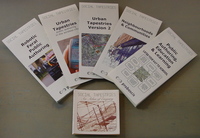
Yesterday Proboscis organised an open dialogue on Cultures of Listening for Interdependence Day at the Royal Geographic Society. The dialogue took the form of a series of conversations between an invited group of artists, social scientists, teachers, researchers, curators and policymakers at a picnic in Kensington Gardens, just across from the RGS.
Our aim was to use the informal setting of a picnic and our role as hosts to bring together a diverse group and stimulate conversations, rather than hold a more formal debate or discussion. This placed the emphasis of the dialogue on being a culture of listening rather being about one. After an hour and a half of introducing people to each other and connecting conversations, the group came together to reflect on what we had heard and said, followed by more conversation and connections over lunch.
Proboscis has commissioned artist Camilla Brueton to create an artwork inspired by the event, a distributable form of which will be made available in the next few weeks.
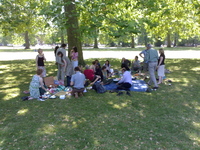
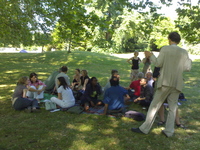
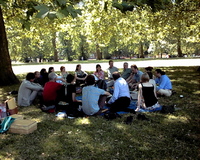
Last week we presented the Feral Robots and Urban Tapestries at the London Knowledge Lab as part of their Open Evening. The Knowledge Lab was opened in December 2004 and the event presented an overview of projects and work over the last two years. Birkbeck College's Department of Computer Science are one of the two partners institutions (with the Institute of Education) behind the Knowledge Lab and collaborated with us on designing and building the recent public authoring Feral Robots. We are currently developing our Sensory Threads project with the department, which we are fundraising for this year.
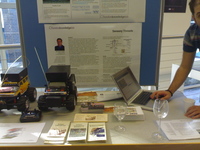
Sonar, Barcelona (15-17th June)
Urban Tapestries and Social Tapestries have recently been part of the Sonar Festival in Barcelona, in the exhibition, Always On.
Generalized Empowerment, London (18-23rd June)
We also participated in Generalized Empowerment, a conference and exhibition organised by London/Brussels/Barcelona collective Citymine(d). The exhibition continues at Village Underground, 54 Holywell Lane EC2 until Friday (open 2-6pm).
Digital Hub, Dublin (26th June)
Urban Tapestries/Social Tapestries has also been selected to form part of the evolving visitor exhibition at Digital Hub's new building (formerly Media Lab Europe) in Dublin.
Futuresonic, Manchester (21st July)
We will be demonstrating the public authoring Feral Robots at Futuresonic in Manchester on Friday July 21st at the Museum of Science and Technology.
Conferences
Over the next few months we will be participating in several conferences and symposia:
• Feral Robots Paper & Presentation at IEE International Conference on Intelligent Environments in Athens, Greece, 6th July
• Feral Robots Paper & Presentation at UK-UbiNet Workshop, Imperial College London, 12th July
• Social Tapestries Paper on "Public Authoring Across the Digital Divide" and a Sensory Threads/Feral Robots workshop at the Society of Cartographers Annual Symposium, Keele University, 6th September
• A Feral Robots Video has been submitted for UbiComp 2006, 17-21st September
We are pleased to announce the first in a series of Cultural Snapshots by intern Megan Conway, looking at how Social Tapestries connects with recent education policy. Megan is currently completing an MPhil in Politics, Democracy and Education at the University of Cambridge.
You can download it as a PDF here.
Proboscis will publish two bookworks at the end of June:
Social Tapestries An Atlas of Enquiry
The atlas contains five maps which trace the territories and unfolding outcomes of Social Tapestries, an investigation of public authoring in civil society and the emergence of a public knowledge commons. Published in a limited edition of 1000. The maps are:
– Public Authoring, Education & Learning
– Urban Tapestries public authoring in the wireless city
– Neighbourhoods & Communities
– Urban Tapestries version 2
– Robotic Feral Public Authoring
Update: An Atlas of Enquiry can be ordered here at £5 plus post and packing.
Social Tapestries A Case of Perspectives
A limited signed and numbered box edition of 200 containing a set of Tapestry Cards, a Social Tapestries StoryCube and the Atlas of Enquiry. The 63 Tapestry Cards (3 sets of 21) make up a tactile embodiment of the myriad stories, fragments and processes of Urban Tapestries. At the heart of these are a Myriorama or, Endless Landscape, of 21 paintings. This is a device for storytelling that can be used by individuals or groups, each card extending, embellishing or forking a narrative flow. The 21 cards depict fragments of a panorama that can be arranged in thousands of combinations yet still create a continuous landscape. The reverse of the 63 Tapestry Cards fit together to form a map of London overlaid with pockets and threads from Urban Tapestries.
The StoryCube creates a shift in the perception of scale, making tangible and tactile the abstract and complex concepts of public authoring into something that you can hold in the palm of your hand. Its six faces visualise some of the key concepts of public authoring.
We will be posting details on how to order the Case (£65 plus post & packing) in the next week or two.
Over the past two years of Social Tapestries we have been collaborating with Kevin Harris, first at the Community Development Foundation, and, since last summer, in his capacity as an independent community development consultant working as Local Level. Through Kevin we encountered Bev Carter of Partners in Change and were invited to work with the Havelock Independent Residents' Organisation (HIRO) to explore how our ideas and practices of public authoring – knowledge mapping and sharing – could make a difference at neighbourhood level.
Proboscis and Local Level began working with HIRO last July and Kevin has now written a Cultural Snapshot about what we have learnt of the issues and challenges facing local people.
Common Knowledge
Community development and communication on a housing estate
Residents striving to improve conditions on a low-income estate face a range of problems that are appropriate for collective action. But their ability to act collectively may be constrained by a range of factors. This essay offers an impressionistic view of conditions on the Havelock estate in Southall, west London, based on an assessment of the communication and information ecology.
The essay offers a snapshot of the physical conditions, low levels of social interaction, and ‘civic absence’ that characterises the neighbourhood. It notes the sense of weakening community presence in the face of unresponsive environmental services and a looming drugs threat. It attempts to explain why participation in community initiatives is sometimes very difficult to establish or sustain, and it contrasts this reactive, fragmentary style of urban life with the contemporary image of lively urban consumption.
A Cultural Snapshot – Public Authoring & Feral Robotics – jointly authored by the project team is now available to download.
Proboscis has also completed a new short film about the project, which we will be presenting at the talk tonight at the Dana Centre.
Update: An 8.1Mb version is now available to download.
The first of a series of 'maps' about Social Tapestries projects and research has just returned from the printers. We'll be launching it during the Takeaway Festival next week at the Science Museum's Dana Centre. Meanwhile here's a sneak preview of what it looks like:
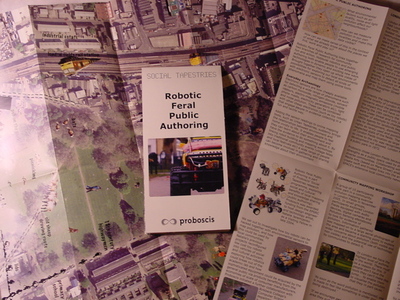
Kingston University, Knights Park, KT1 2QJ
Thursday 23 March, 6.30pm
I will be participating in an evening seminar on the subject of new forms of social living and participation in suburbia:
"Led by Kingston University's School of Suburban Studies, the evening will include presentations from Melissa Mean of Demos, author of the People Make Places - growing the public life of cities report and Giles Lane, Director of Proboscis, an artist-led creative studio which specialises in community inter-action and innovation.
The seminar will be led by Dr. Nick Hubble, Senior Researcher at the School of Suburban Studies, who will be challenging old stereotypes of the suburbs. In Tomorrow's Suburbs, he will be considering new forms of social networks, drawing upon the latest academic ideas about qualitative research and social capital."
The event forms part of Kingston Council's Think in Kingston programme supported by Kingston University. Further information:
www.kingston.gov.uk/arts
http://proboscis.org.uk
http://fass.kingston.ac.uk/research/centres/suburban_studies/
www.demos.co.uk
Update: Nick Hubble appeared on a BBC Newsnight film about suburbia just a few hours after the event. Kingston University also now has a webpage with presentations.
We've just published a postcard about the Robotic Feral Public Authoring project and updated the website to include the technical documentation as well as the software developed for the robot.
The project is not quite finished yet, we will be publishing a Cultural Snapshot on the ideas and concepts later in March as well as a special fold-out map and a short film about the project. We also hope to complete a second prototype feral robot in time for the project demonstration at the Takeaway Media Festival at the Science Museum's Dana Centre in London, March 27th-31st. The festival is part of the NODE.L season of media arts in London.
Update: a PDF of the Technical Documentation is now available (2.1Mb).
I participated in the Locative Media and Emplacement panel at the May You Live in Interesting Times conference on Friday. The two halves (morning and afternoon) brought together an interesting slice of people (Martin Flintham, Jen Southern & Jen Hamilton, Dr Sarah Green, Nina Pope & Heath Bunting) and projects working at a more conceptual end of the spectrum of 'media arts' and 'locative media'.
It was refreshing for the discussions not to revolve around the merits of the technologies but issues of creative and cultural engagement with people. It seemed to me that we actually got to talk about the artistic elements of making work in this field not just the intentions that using technology often entail, but rarely achieve.
Together with Laura Forlano (NYCWireless), Andrew Patterson (AWARE/MediaLab, UIAH) and Christian Sandvig (University of Illinois Urbana) I participated in the New Media Activism and the Urban Fabric panel at the Re:Activism conference in Budapest last week. Our panel considered some of the issues and concerns with thinking of new media and media arts practices as 'activism', as well as responding to issues raised by the papers presented as part of the panel's theme.
Differences in styles of practice and whether or not the label of activism was appropriate or even necessary was one of the key topics of discussion, as well as the roles played by artists and activists in social processes. The inherent problems we attempted to address included attempting to define 'activism', as it means different things to different people, and the more problematic questions of "for whom it is enacted?" and "by whom?". As a panel we had previously discussed a number of issues, and found common ground in agreeing that the importance of these forms of practice were not always in delivering technical infrastructures but the social structures underpinning projects. Christian initiated a wider discussion on the problems of scale – at what point is it just not enough to continue doing small scale experiments and projects? How can we begin to imagine scaling up to reach/affect much larger communities?
Towards the end of the session, Daniel Tucker from Counter Productive Industries made a significant intervention by summarising some of the key issues at stake. From my notes –
• the interpretation of the efficacies of scale
• visibility of the interventions and impacts
• numbers of people involved or affected
• the pleasure and desire of participation
• the material effect of the activism/project
• risks involved (for participants/actors/communities etc)
• role of stories and education in angaging with communities
The discussion of these then threw up a few other issues:
• internal consistency of the aims of the activism/project – problems of distraction and tangents
• equity – who has ownership and stakes in the processes and outcomes?
The conference brought together a very broad section of people from different sectors and disciplines which made for dynamic conversations and unexpected encounters. Yet I felt a twinge of tiredness in the continuing utopianism applied to new media technologies and the uncritical belief that the Western European and North American agenda for 'openness', 'free access' and 'global solutions' are suitable for everyone irrespective of their culture, beliefs or context. I feel that there are a good deal of unconscious imperialist/colonialist attitudes lurking just beneath the surface of many of these ideals, which a bit more humility and self-reflection might temper.
I gave a keynote presentation for Cybersalon & Open Spectrum UK's Future Wireless event at the Dana Centre, London on Tuesday evening. My session also consisted of Peter Cochrane of Concept Labs and Ian Robinson (Head of Emerging Internet Access products for BT).
The text of my presentation notes is here.
I gave a presentation based on the UT Report – Public Authoring, Place & Mobility" – at Stroom Art and Architecture as part of the symposium, The Matching Link. The sympoisum was organised by Jouke Kleerebezem of the Jan van Eyck Akademie, with Stroom to celebrate the exhibition, Welcome to FusedSpace Database.
The speakers were invited to "reflect on and present projects which enhance public space by means of communication media. Examples will show how the flow of information today has merged almost seamlessly with the flow of goods, traffic, people — where computing has become ubiquitous. Arguably our notion of ‘public’ and ‘private’ space is deeply influenced by its everyday mediation. The Matching Link will look into the information media which are at our disposal to ‘author our (own and each other’s) environment’: access and navigate its physical and/or information realities, contribute to them, shape and change their experience, organise ourselves in and through such ‘spaces’, and other issues relevant to everyday information manipulation."
I was very pleased to share the platform with Roland Haring of Ars Electronica Futurelab who presented their work on Digital Graffitti, a project sharing much with Urban Tapestries. It was particularly inspiring to discuss the ideas and prcatices we've been working on in the context of Stroom, whose own take on public art and its relation to broader social and cultural phenomena is wholly original.
The Urban Tapestries white paper, Public Authoring, Place and Mobility concludes with a number of policy proposals we believe to be necessary for achieving the project's vision of a twenty-first century public knowledge commons. Based on our experience gained in researching and developing Urban Tapestries, Proboscis proposes the following recommendations for public and corporate policy makers to consider (full versions in the report):
Innovation from the margins to the centre
Governments, researchers and businesses need to pay greater attention to the needs of actual people in real contexts and situations rather than relying on marketing scenarios and user profiles.
Open Networks for Mobile Data
Telecom network operators need to recognise the desires of people to communicate (by voice or data) with each other irrespective of the company they purchase their service from.
Open Geo Data
There is a clear and pressing need for free public access to GIS data to make public authoring and a host of other useful geo-specific services possible.
Reinvigoration of the Public Domain
Public authoring has the potential to be a powerful force in enriching the public domain through the sharing of information, knowledge and experiences by ordinary people about the places they live, work and play in.
Public Services Engaging with People
Public authoring could be employed to create new relationships of trust and engagement between public services and the people they serve. Public authoring proposes a reciprocity of engagement whereby public services would not just provide information but benefit directly from information contributed by citizens.
Market Opportunities
The wealth of public data created by public authoring will provide many market opportunities for business people and entrepreneurs. The not-for-profit sector needs to embrace the energy and creativity this engenders as much as the commercial sector needs to embrace the need for people to be more than just consumers.
Location Sensing & Positioning
The technological imperative for defining a person’s position needs to be dropped in favour of an approach that incorporates the rich nature of the physical world’s location information – street signs, shop signage etc
Including Everyone
The drive to use the latest technologies and services must not exclude those who choose not to adopt them, or cannot, for whatever reason.
Time and Relevance to Everyday Life
These new forms of communicating will not appear overnight but will need careful cultivation and time to flower. To realise their fullest potential they will need more than just grass roots enthusiasm and activism. They will require regulatory nurturing and calculated risks on the part of business people.
The reports are free for private/non-commercial use by individuals, academics and non-profit organisations in the arts and civil society sectors.
Request the reports
As part of our final summation of the Urban Tapestries project we developed four 'principles' of public authoring:
Cooperative Not Hierarchical
Public authoring relies fundamentally on cooperative, and largely anonymous, sharing of the kinds of knowledge, stories, memories and information that people think will be of interest to others in their vicinity. It complements and augments traditional centres of knowledge but side steps their top-down validation through trust, risk and chance.
Co-creation Not Just Consumption
Public authoring relies on the co-creation of its own content by the people who participate in sharing it, rather than the consumption of pre-prepared content offered by media companies. It is essentially another form of personal communication, differing only in its link to geographic places and the public nature by which it is shared. It is a reminder that people are not just consumers – they are the actors, agents and authors of their own experiences.
Organic Not Static
Public authoring should both grow and fade with time, at the pace set by the people who participate in it. It is both the layering and excavation of layers of knowledge and experience – a real-time microcosm of how our cities and communities develop, change, prosper and die. It adds persistence to local memories and knowledge that otherwise might completely disappear. Sharing in an open, distributed way enables knowledge and information to pass beyond the limits of its originators social circle or the immediate situation and context. Yet it shouldn’t point to an over arching desire to record everything or that all content should persist indefinitely... Some content might be time-sensitive and expire automatically on the date being passed, other material might belong to a class or category that fades with time. The point of public authoring is to reflect the complexities of the world we live in, not to simplify it or attempt to replace any aspect of our human interactions.
People Not Systems
Public authoring should augment and assist our everyday life, not seek to replace any aspect of it. It should be the trigger for social encounters, not a barrier to participation in social or community activities.
The reports are free for private/non-commercial use by individuals, academics and non-profit organisations in the arts and civil society sectors.
Request the reports
The final reports on the Urban Tapestries project will be launched at the Social Tapestries Public Forum on Friday 1st July 2005.
Report Summaries here [A4 PDF 76Kb]
Urban Tapestries: Public Authoring, Place and Mobility
A Proboscis White Paper by Giles Lane & Sarah Thelwall
This white paper presents our vision for public authoring and our conclusions on its relationships to place and mobility. We argue for design solutions to focus on actual people in real world contexts and situations, offer insights from the public trials of our prototypes and set out Proboscis’ own future vision and research agenda. Finally we recommend a series of policy proposals for realising a public knowledge commons, structured around place.
Urban Tapestries: Project Report
A Proboscis Report by Giles Lane & Sarah Thelwall
This report gives a chronological account of the development of the project and provides detail of and context for the key issues that arose over its two year span. In describing the activities and outcomes of the project it also connects the completion of Urban Tapestries to the research brief for Social Tapestries, a follow on research programme. A summary of the outputs, press coverage, some statistics and project credits are listed at the end of the report.
Urban Tapestries: Observations and Analysis
A Proboscis Report by Giles Lane, Alice Angus, Victoria Peckett & Nick West
This document presents the observations and qualitative evaluation of participant activity and feedback from the bodystorming experiences, the public trial of December 2003 and the field trial of June/July 2004.
The reports are free for private use by individuals, academics and non-profit organisations in the arts and civil society sectors. Complimentary copies are available for affiliates, project funders and partners. Commercial organisations, government departments and government agencies are requested to purchase reports. This income is important in enabling us to continue our work.
Order the reports
Purchasers will receive bound copies as well as digital copies. Free copies will be digital only.
Proboscis is pleased to announce that four new DIFFUSION eBooks will be published on Thursday 30th June, and launched at the Social Tapestries Public Forum on Friday 1st July.
The eBooks have been commissioned for the third series of Species of Spaces, inspired by and in homage to George Perec's eponymous book. The series contemplates how we occupy space in the contemporary world of the twenty-first century – the virtual and physical, emotional and social – what Perec called the "infra-ordinary". Species of Spaces questions the trajectory of contemporary urban existence, intervening in current debates on how the virtual and the physical relate to each other, and how technological advances affect cultural and social structures.
The four eBooks are:
– Stirring Still: The City Soul and its Metaspaces by Raoul Bunschoten
– On Spatial Perception by Nina Czegledy
– Separate Spaces: Some Cognitive Dimensions of Movement by Scott deLahunta
– Labours of Location: Acting in the Pervasive Media Space by Minna Tarkka
The eBooks will be available to download here as A4 and US Letter PDFs from Friday 1st July.
We will be holding a half-day public forum on the Social Tapestries research programme hosted at the Stanhope Centre for Communications Policy Research on Friday July 1st 2005 1-6pm.
The event will bring together practitioners from the arts, industry, government, civil society organisations and academia to review the work underway for Social Tapestries and stimulate public debate on the issues.
This event is a pre-competitive forum for the free exchange and flow of ideas intended to generate opportunities for dynamic partnerships that find common ground between artists, culture organisations, civil society organisations, academia, government and public agencies, business and industry.
To book a place please complete the online form. Places are limited to maximum of 70.
I took part in the Forum on Open GeoData hosted by the Open Knowledge Foundation at the Stanhope Centre for Communications Policy Research.
At the forum I spoke about our collaborative partnership with the Research & Innovation group at Ordnance Survey and mentioned our aim to develop a model for free, non-commercial access to the OS's GIS data for projects like Urban Tapestries. The recent announcement by the BBC, Channel 4 & the BFI about the adoption of a Creative Commons license for non-commercial access to and use of their Creative Archive project coincided with Proboscis' submission of a first draft Creative Commons license to the Ordnance Survey for consideration. It seems that now is an excellent time for developing public policy positions and lobbying central government for wider public access to data owned and collected by public agencies and entities owned by the government.
Contributing to the establishment of public access to GIS data has been one of Urban Tapestries' (and now Social Tapestries') project goals and was the foundation of our agreement to collaborate with the OS back in 2003. In drafting up the license I had the benefit of advice from Programme in Comparative Law at the University of Oxford, who led the project to harmonise Creative Commons with UK Law.
An MP3 recording of the forum is available here.
NMK – New Media Knowledge have just published an article on UT based on the presentation at PLAN.
Urban Tapestries: Experimental Ethnography, Technological Identities and Place
Roger Silverstone and Zoetanya Sujon
Abstract
Urban Tapestries provides a mobile location-based platform to connect people with the places they inhabit through their stories, experiences and observations. Currently based on an 802.11b mesh network in the heart of London, ordinary people author their stories of the city and embed them in the places that inspire them. Others who are logged into the system can read these stories, author their own and engage the largely invisible, multidimensional layers accumulating in the city. Our research asks if people use UT in meaningful and interesting ways. Drawing from theories of everyday life and urban space, we have developed experimental ethnography as a method for investigating the relationships between communication technologies, users and the socio-geographic territories around them. Respondents are asked to play with an early Urban Tapestries prototype and this research explores what they do, their technological identities, their relationship to place and the meanings they generate. Urban Tapestries facilitates the negotiation of boundaries and we found that it does augment notions of connectivity - to place and to those within that place. However, our research revealed that some do not interpret this connectivity positively.
Download the Electronic Working Paper as a PDF file.
I gave a talk today at the PLAN [Pervasive and Locative Arts Network] event which was somewhat rushed so have put a PDF version of it online for those who wanted to know more:
From Urban Tapestries to Social Tapestries
A new essay has been published today in Proboscis' Cultural Snapshots series:
Urban Tapestries: the spatial and the social on your mobile by Nick West [A4 PDF 80Kb] was originally published in the catalogue accompanying Archilab 2004, Le FRAC, Orlèans.
I gave presentation on the theme of City of Memory at the Devices of Design colloquium held at the Canadian Centre for Architecture in Montreal. Run by the CCA in partnership with the Fondation Daniel Langlois the event addressed the implications for architecture and urbanism brought about by the increasing use of digital media in design practices. The other speakers were:
Marco Frascari (G. Truman Ward Professor of Architecture, Virginia Tech);
Mario Carpo (Consulting Head, Study Centre, Canadian Centre for Architecture
Associate Professor in Architectural History, Ecole d'Architecture de Paris – La Villette);
Mark Wigley (Dean, Graduate School of Architecture, Planning and Preservation, Columbia University, New York);
Peter Galison (Mallinckrodt Professor of the History of Science and of Physics, Harvard University);
Greg Lynn (Full Professor, Universität für angewandte Kunst Wien);
Bernard Cache (Architect, Objectile, Paris)
The event also considered the longer term implications for museums and archives in conserving digital artefacts – both digital artworks and architectural materials. The second day saw a presentation by Alain Depocas on the Variable Media project by the FDL and Guggenheim investigating emulation as a means of preserving works created on and for obsolete technologies into the future.
The event also coincided with a brilliant show at the CCA, the 60s: montréal thinks big, charting the social cultural and architectural shifts that transformed Montreal into a dramatic modernist city.
I've presented UT and Social Tapestries three times this last week. First at the DTI's Next Wave Knowledge Transfer Meeting on Wednesday 287th; then at the Ordnance Survey Research & Innovation group in Southampton on the 28th; and finally this evening to the Geographic Information Club at City University here in London.
Its been an exciting week of conversations and dialogues with colleagues and fellow researchers delving into the minutiae of possibilities that UT offers, and the range of possibilities that we can explore for ST.
We're also getting closer to finalising a series of collaborations building upon UT for Social Tapestries with Kingswood School, Hull; Mauro Cherubini of EPFL in Lausanne; France Telecom R&D; Christian Nold's Bio-Mapping project and Mikel Maron's Worldkit. In addition to this we're just starting to develop a collaboration with the Community Development Foundation and Citizens Online.
Last week I spoke about Urban Tapestries at Archilab 2004 -- a biannual gathering of innovative international architects. The signage for the show dominated the town of Orleans, France for the entire week!
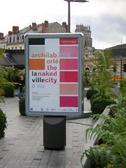
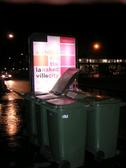
The theme of this year's conference, "The Naked City", examined ways in which the city could be stripped bare of its conventional layers so that the material underneath could be combined in novel ways. Bart Lootsma, the curator, wanted the assembled architects to appreciate the insight of the Situationists and the application of the dérive to their work as the designers of urban reality. Naturally, this emphasis suits the Urban Tapestries approach wonderfully -- we are trying to build toolsets that allow residents of the city to not only create, but to archive their own personal dérives. I set out one version of this approach in the article that I wrote for the exhibition catalogue entitled: "Urban Tapestries: The Spatial and the Social on your Mobile".
The Conference also featured a gorgeous and extensive exhibition, for which Giles designed an Urban Tapestries display consisting of a film loop, a table for constructing a specially-produced bilingual eBook for the event, and three posters examining Public Authoring, our Prototypes and Trials, and our Research Methods. (The room shown here was one of over a dozen such galleries at the exhibit!)
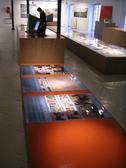
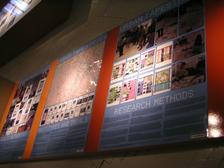
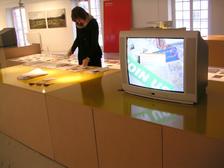
We've just added two Flash animations to the Urban Tapestries website which walk through two sample scenarios of use for public authoring.
Animation 1 has a man use UT to resolve a practical issue about mobility in the streets and in so doing has an unexpected cultural encounter.

Animation 2 has a woman use UT to remain in touch with her local neigbourhood whilst she travels abroad for a period of time.

The animations were devised by Giles Lane and Michael Golembewski and animated by Michael Golembewski.
Last Thursday Proboscis organised a one day Creative Lab at the London School of Economics exploring the theme of 'public authoring and civil society'. The Lab brought together participants from range of organisations, including (among others) Citizens Online, Community Development Foundation, Learning & Skills Council, Ordnance Survey and the University of Cambridge.
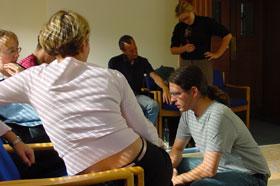
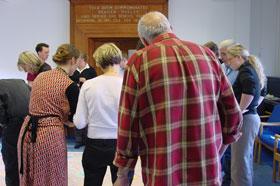
During the morning we brainstormed uses and scenarios for knowledge mapping in civil society. In the afternoon we bodystormed some of these ideas within the context of education, community arts, housing & local government interactions.
We'll be documenting the outcomes of the day over the next 2 weeks and producing an eBook to summarise the issues, ideas and scenarios arising from the day. We'll use this to help guide the development of future collaborations and experiments withing the Social Tapestries research programme.
The E-Government Bulletin features UT in July's issue. Exploring uses for UT in e-government is one of our aims in the Social Tapestries research programme – looking at ways in which local knowledge mapping and sharing can have a positive impact on communities and civil society.
Will Davies new report for the Work Foundation's iSociety research project, Proxicommunication ICT and the Local Public Realm features UT as one of the case studies. Will was one of the participants in our recent field trial.
Ant Evans at Cass Business School in City University (who participated in the first public trial in December 2003) has written an essay on: knowledge geography and the fourth place; some lessons for km from urban mediascapes.
The essay proposes spatial knowledge management systems as a 'fourth place', a kind of virtual place for making unexpected connections in the digital world.
Two essays have been published today in Proboscis' Cultural Snapshots series:
Social Tapestries: public authoring and civil society by Giles Lane [A4 PDF 167Kb] which outlines some of the ideas and practices that are informing both the new Social Tapestries research project and the last two years of Urban Tapestries.
Sensing the City and other stories by Katrina Jungnickel [A4 PDF 209Kb] – a paper on Urban Tapestries given in April 2004 at DigiPlay 2: Mobile Leisure and the Technological Mediascape, at the University of Surrey.
Today's Guardian Online section has an article on the OS's MasterMap GIS database, which mentions UT as a research project exploring potential uses for the data (but doesn't credit us, nor provide a link).
Bill Thompson wrote about UT in his column for the BBC last week and it was slashdotted yesterday.
Yesterday I gave a lightning presentation on Urban Tapestries at the NotCon'04 gettogether. (Five minutes for the presentation, five minutes for questions -- I felt like a tobacco auctioneer!)
One of the best questions (about spam in public annotation systems) got shot down by the moderator -- but people are talking about it over at plasticbag.org.
On May 15th, I gave a presentation on Urban Tapestries and conducted a Bodystorming at the PsyGeo Conflux in New York City -- fun!! (see thumbnails below). The conference was an interesting contrast to the recent spate of European gatherings that seemed to present "locative media" as some kind of spinoff/sibling/offshoot of new media. Maybe due to the context of being in the middle of the Lower East Side art scene, there was much more "psychogeography" than cutting-edge high-tech.
Thus there was a human chess game on the streets of Williamsburg, a 24-hour road trip throughout the 5 New York boroughs, musings on the history of dérive and the flâneur, and a great talk by Peter Lamborn Wilson on his methodology in exploring the forgotten sacred backwaters of North America.
Don't get me wrong -- digital goodies were still alive and well at the Conflux! An outstanding example was the One Block Radius project presented by conference organizers Christina Ray and Dave Mandl. Over the course of several months, they obsessively documented one square block that will be the new site of the New Museum of Contemporary Art.
Their project made me realize that we really have to tackle the hard problems of filtering and scaling if we're going to build a functional, urban-wide annotation system. They show ONE block annotated by TWO people -- what happens when you open up the annotations to all comers? And then what happens when you scale up from one block to one city?? Mindboggling possibilities! Check it out.
(photos by Christina Ray - Click to enlarge)
Nick presented Urban Tapestries, and I took part in a panel discussion at Cybersalon's Mobile Futures event at the new Dana Centre on Thursday evening. The other panel members were James Woodhuysen (Professor of Forecasting and Innovation, De Montfort University) and Paul Amery (Partner Strategy Manager, Orange) with Richard Barbrook (Hypermedia Research Centre).

I presented a paper at the Digiplay seminar convened by Dr Nicola Green at University of Surrey yesterday. The seminar entitled 'Mobile Leisure and the Technological Mediascape' was the second in a series of six run by the CRIC and funded by the ESRC. The seminar fostered a wonderfully open atmosphere where speakers were encouraged to discuss work in progress ideas and there was a provocative mix of multi-discplinary approaches and mobile leisure technology projects.
My paper was called Urban Tapestries; Sensing the city and other stories and it drew from de Certeau's writings on Walking in the City (1998) and from the posts on the weblog from participants of the December trial.
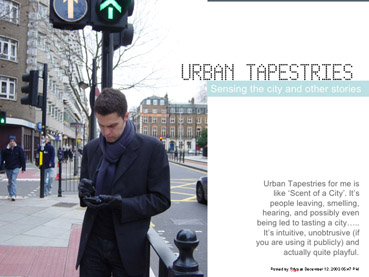
Hello there,
Iwas browsing the web and found this blog. Some interesting quotes. Keep them coming!
Alice
eliminate debt uk
As part of the Life of Mobile Data Conference at the University of Surrey, I convened and chaired a panel session which looked very broadly at transdiciplinary research models in this area of mobile culture.
The panelists were each drawn from a different area of practice currently engaged in exploring and developing mobile projects: Linda Doyle (dept of Electrical Engineering at Trinity College Dublin); Constance Fleuriot (Mobile Bristol Project, Computer Science Dept, University of Bristol); Chris Heathcote (Interaction Designer, Orange UK) & Nick West (Information Architect & Researcher, Goldsmiths College & Proboscis).
Panel Theme:
The paradox of discussing 'mobile data' is how to avoid treating it as a static entity when by its very meaning it is transient, fluid and elusive. What might this data be that is 'mobile'; what might be mobile about such 'data'? Could it be that the mobile element is not the data itself but us the users/creators/subjects/objects endlessly reconfiguring the moments and spaces when we access it?
The recent interest in pervasive networks, ubiquitous computing and geo-specific (or location-based) information has been largely focused on the technology rather than why we might want or need such systems and what we might do with them. Recent projects, such as Urban Tapestries, have sought to bridge these social and cultural issues with technical development, creating transdisciplinary models which bring analytical and practical research together for a richer understanding of the forces shaping mobile technologies, and shaped by them.
This panel will discuss the implications of transdisciplinary models and experimental methodologies for understanding, and creatively responding to, our emerging interactions with 'mobile data'.
Having given a slew of presentations recently (at University of Surrey, The Public, Middlesex University, University of Westminster, BBCi and soon at Nokia Research Centre) I decided to use one of our other technologies (DIFFUSION eBooks) to collate and disseminate a synopsis of the project.
Download, print out and make up your Urban Tapestries eBook here.
Rachel Murphy's Catalogue of Ideas for future and emerging technologies interfacing with Urban Tapestries is now on the UT website.
Giles and I recently travelled down to the University of Surrey in Guilford to attend the "Approaching the 'City'" conference put on by the INCITE group there. We set up a beautiful series of posters that Alice and Giles put together on the various facets of Urban Tapestries, and Giles chaired a panel. I was frankly amazed at the broad variety of disciplines that all seemed to fit comfortably under the conference's umbrella of "alternative urban studies". We heard researchers from film theory, cultural and social anthropology, english studies, history, interaction design, virtual reality art, sociology, academic and corporate research labs, human geography, and of course Proboscis (choose your category!)
Eric Paulos and Elizabeth Goodman presented some fascinating research done for Intel Labs on "familiar strangers" -- those people we see all the time in our daily travels, but we don't really "know". They've developed technology that people could use to interact (anonymously!) with other familiar strangers in public spaces. Especially interesting was the device's ability to display anonymous local data about "turf" ("is this a place where people like me frequently visit?") and "tribe" ("are the people here right now like me?") Ideas like these seem like a logical next research area for Urban Tapestries -- extending it from a system about "places" to one that also includes "people in places"!
I had an interesting culture clash moment recently -- looking at Urban Tapestries from two *completely* different perspectives. At 8:00 in the morning, I met up with other students of the "Reading the City" course at Goldsmiths College to walk with Prof. Michael Keith through the Brick Lane area, and hear his commentary on the rich and varied cultural histories of that neighborhood. The entire time I thought: "This is a *perfect* venue for Urban Tapestries -- how else could you portray the wild overlap of cultures that exists here??" My only nagging doubt was that UT was far too technical, upscale and ivory-tower for the average resident of the community. (as in -- who would carry PDAs around here at night -- if they could afford them?)
Then I took the tube to the DTI's Knowledge Transfer Community Seminar in Westminster, where Alice, Rachel and I were representing Urban Tapestries as part of HP's Mobile Bristol project. The difference in venues was striking -- Urban Tapestries easily had the most "street" feel of any display there! (I was also the only male not in a suit, and Alice and I were about the only ones wearing color in the room! You can see us at the back of the shots here) It made me feel that Urban Tapestries had a chance of popular acceptance, especially when compared to the "smart fridges" and other laboratory creations that were on view at the seminar.
Phil Stenton of HP's Mobile Bristol Project gave a nice presentation that included information about Urban Tapestries. It seems like what we're building is complentary to their work in Bristol.
You can check out all the presentations from the Seminar here
Urban Tapestries had two more presentations this week: one to the Media and Communications Department at the London School of Economics, and a public talk at the DMZ Festival at Limehouse Town Hall.
Both talks went well – generating lots of questions from the audiences as well as interest in taking part. A number of MA students at the LSE expressed interest in taking part in some way in the research – particularly as we move into the next stage of the project (Social Tapestries) in 2004. There was also a lot of interest from the DMZ audience in taking part in the trial.
Giles and I gave a talk on Urban Tapestries and Urban Tapestries-like systems for museums at the CHArt conference, Birkbeck College London. The focus of the conference was about the convergence of museums, art galleries, the history of art and digital media.
We demonstrated four different scenarios for different potential uses of a UT-like platform, the users being school children, people from different cultural backgrounds, amateurs, scholars and professionals and finally creatives.
We fielded a few questions asked about us making assumptions about the relationship between museums and users, and, although we stressed the likelihood of entirely new devices emerging over the next few years, some were sceptical about our chosen client devices. A lady from the British Museum was quite concerned about the idea on the whole (especially aloowing children to annotate their own commen ts unmoderated!), but no surprises there considering that we have had no responses at all from the British Museum even though Giles has tried to contact them about collaborating on research.
We met a few people who were very excited about the project who have offered to pass on relevant links to the project. Giles also talked to people from the Science Museum developing the Science and Culture project.
Last night was the last of four talks I've given on Urban Tapestries here in New York. Invited by Creative Time (a public art agency), the New School University and Parson's School of Design, the talk was part of a series they are running called Blur
The three other talks were given to students on courses at Parson's School of Design (class led by Andrea Moed), School of the Visual Arts (class led by Kathy Brew) and Tisch School of the Arts Interactive Telecommunications Program (class led by Anthony Townshend).
There is a huge buzz here about public wireless technologies, with 802.11 appearing to be the driver of excitement and innovation rather than mobile phone networks. 10 of the city's public parks now have free public wireless access, and laptops are visible all over the city as people log on in their lunch hours and coffee breaks.
Urban Tapestries has stirred up some excitement about possibilities for the future and there is a lot of interest (as well as offers of support) to stage a trial over here sometime in 2004 or 2005.